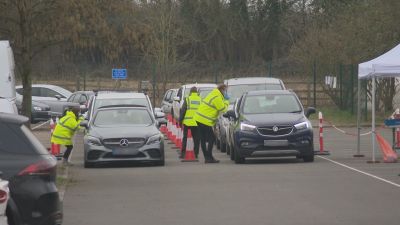Surge testing for Brazilian variant in South Glos to end - all you need to know

Surge testing for the Brazilian variant of coronavirus ended in five postcode areas on Sunday 14 March.
The local authority urged eligible residents living, working, or in a support bubble with anyone, in the Bradley Stoke, Little Stoke and Patchway areas to get a test.
Facilities in Stoke Gifford and Patchway opened from 9 am to 6 pm as did the five community-based collect and drop sites from where people can collect a home testing kit and return it without having to book a slot.
People who have collected a test kit and completed it are also encouraged to return it for processing as soon as possible. Completed tests can be returned to the collect and drop sites until the end of the day on Tuesday 16 March.
The surge testing was put in place following the identification of the Brazilian Covid Variant of Concern in the area.
Through enhanced contact tracing work, the local authority, together with Public Health England (PHE), has identified a small, contained group of contacts around the confirmed cases of the variant.
PHE has since announced that three additional cases have now been confirmed, in people who are directly linked to the already-known cases.
Sara Blackmore, the Director of Public Health for South Gloucestershire, said, "In terms of risk to the community, it remains low.
"I appreciate people may have concerns hearing about new cases but what we have identified via our precautionary approach - which is additional testing and enhanced surveillance and contact tracing - is that cases directly linked to the initial cases are the Variant of Concern also.
"So we're still managing a very contained situation."
The relevant postcodes, which are different from those that were part of the surge testing programme between 7 and 21 February, are:
• BS32 0• BS32 8• BS32 9• BS34 5• BS34 6
Mike Wade, Acting Deputy Regional Director for Public Health England South West said: “These additional cases are all close or household contacts of the two existing P1 cases in the area. They were offered testing in response to the initial cases.
“The important thing to remember is that Covid-19, no matter what variant it is, spreads in the same way. That means the measures to stop it spreading do not change. Stay at home and if you do need to go out for essential reasons, cover your nose and mouth, wash your hands thoroughly and keep your distance.”
“In addition, please do take up the offer of the vaccine if you’ve been invited. Vaccine protects against the most severe cases and Covid 19 related deaths.”
Around 15,000 people have so far been tested as part of the programme with only 20 tests turning out positive for coronavirus.
Deputy Leader of South Gloucestershire Council, Councillor Ben Stokes said: “The efforts of our communities in following the guidance to keep themselves, their loved ones and those in their neighbourhoods safe has been a real source of hope and inspiration over the past year.
"The work and dedication of council staff on the front line and behind the scenes to play their part has been a source of pride for me as well.
"It is vital that we aren’t complacent and that we recognise the disease is still out there and that we need to keep observing Hands-Face-Space to keep everyone safe, but with everyone’s ongoing commitment to stay the course while the vaccine roll-out continues we are able to see our end goal in sight".
Sara Blackmore, Director of Public Health for South Gloucestershire said, "What we've been doing through this whole programme is adding to the science and understanding whether there are any additional risks.
"Clearly Variants of Concern are identified as a result of potentially being more transmissable, potentially having an impact on the efficacy of the vaccine.
"We obviously are watching all of that closely but what's key in the first instance is to ensure that we're testing as many people as possible to then identify those individuals who need to self-isolate."
You can find more information about the surge testing programme here.
Read more: